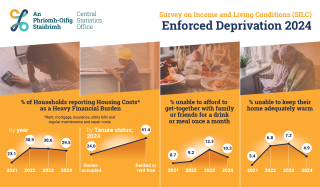844,700 people forced to go without in 2024, of which more than 262,700 are children

The deprivation figures published in today’s Survey on Income and Living Conditions (SILC): Enforced Deprivation 2024 show that just over 844,700 people still struggle to achieve a basic standard of living, including more than 262,700 children. The decrease in the proportion of the population experiencing deprivation since 2023 is welcome, however the deprivation rate remains higher than before the cost of living crisis began in 2021. These figures offer some insight into living standards across the state and show the impact of rising costs on peoples’ daily lives. Of concern is the high proportion of children aged 12-17 living in households experiencing deprivation, this cohort has a deprivation rate of almost 25 per cent, compared with just over 15 per cent for the population overall. Government policy must focus on supporting these households. While the fall in the number of people unable to heat their home is welcome, this can largely be attributed to one-off budgetary measures which will phase out in April. This points to the need for Government to take a long-term approach to the persistent problem of households who are unable to make ends meet.
Deprivation in Ireland 2024 - some key findings:
- 844,700 people were impacted, including more than 262,700 children.
- Households with one adult and one or more children have the highest deprivation rate, 46 per cent.
- People who are unemployed have a deprivation rate of 38 per cent
- People not at work due to a permanent illness or disability have a deprivation rate of 38.5 per cent.
- More than 3 in ten people living in rented accommodation experienced deprivation (31.5 per cent), about three and a half times the rate of those who own their own homes.
- One in two households reported some difficulty in making ends meet this year.
- More than one-third of households experiencing deprivation were in arrears on their utility bills.
- 263,635 people were unable to keep their home warm last year.
Persistent deprivation among vulnerable groups
Of particular concern are the persistently high deprivation rates among households with one adult and one or more children, those who are unemployed and people not at work due to illness or disability. These groups are among those who have been most impacted by the rising cost of living, and they need support. People in low paid jobs and those in rented accommodation are also experiencing high levels of deprivation and challenges making ends meet. The Government should prioritise these groups by benchmarking core social welfare rates to average earnings, making tax credits refundable and by introducing a Living Wage of €14.75 per hour.
Government
These figures should act as a wake-up call for Government. Sustained action is required to support vulnerable households who can’t afford the basics, and that should begin with an immediate commitment to benchmark core social welfare rates to average earnings in the forthcoming budget – this is essential to deliver on the Programme for Government commitment to run progressive budgets. An ambitious national poverty target must be set and achieved. The prolonged and disproportionate impact of the cost-of-living crisis on vulnerable and low-income households is clear. Government must make income adequacy for low-income households a priority and build on recent years of economic growth and windfall revenues to deliver a just society and to put a social floor of adequate income and services in place for everyone.
Policy recommendations for Government:
Acknowledge that Ireland has an on-going poverty problem.
Acknowledge the failure to meet repeated policy targets on poverty reduction and commit sufficient resources to achieve ambitious and credible new targets.
Adopt new, ambitious targets aimed at reducing poverty among particular vulnerable groups such as children, lone parents, jobless households and those in social rented housing.
Link the value of all core welfare payments to movements in average earnings, so that welfare dependent households do not fall behind.
Recognise the problem of the ‘working poor’. Make tax credits refundable to address the situation of households in poverty which are headed by a person with a job.
Support the widespread adoption of a Living Wage so that low paid workers receive an adequate income and can afford a minimum, but decent, standard of living.
Introduce a cost of disability allowance to address the poverty and social exclusion of people with a long-term illness or disability.
Recognise the reality of poverty among migrants and adopt policies to assist this group. Including the full implementation of the White Paper on the Elimination of Direct Provision.
Accept that persistent poverty should be used as the primary indicator of poverty measurement and assist the CSO in allocating sufficient resources to collect this data.
Examine and support viable, alternative policy options aimed at giving priority to protecting vulnerable sectors of society.
Carry out in-depth social impact assessments prior to implementing proposed policy initiatives that impact on the income and public services that many low income households depend on. This should include the poverty-proofing of all public policy initiatives.
Introduce a universal basic income system. No other approach has the capacity to ensure all members of society have sufficient income to live life with dignity.